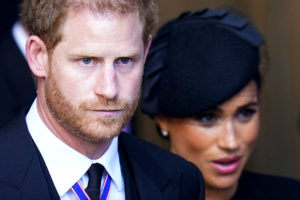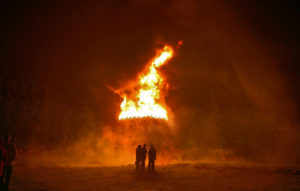One of the characteristics of fame is that it is essentially Faustian in nature; to become a celebrity, one must sell one’s soul to the devil. It’s a highly questionable idea — why should there be such a price for being proficient at acting or music, for instance? — but it is one that persists, regardless of continual pushback from those in the public gaze. The reason it does so is not just down to the power of the media but also because it offers a sense of justice, or at least morbid satisfaction, to the public. We can look at the rich and famous, with wealth, status and lifestyles beyond our wildest dreams, and assure ourselves that there has been a terrible cost to their integrity, privacy and ultimately wellbeing, and suddenly the world seems just a little bit more balanced and just. Even the paparazzi, hated and courted by celebrities, have this Mephistophelean quality.
After a week of controversial and, at times, cringeworthy leaks from his book, Spare, Prince Harry’s interview with ITV came as an anti-climax. His host, Tom Bradby, gamely tried to stir up trouble while seeming to step back from it, suggesting to the Prince, about his relationship with the Royal Family, “you haven’t so much burnt your bridges as taken a flame thrower to them”. Harry’s response was arguably the closest he came in the interview to the disarming candour of his book, claiming “They’ve shown absolutely no willingness to reconcile. And I’m not sure how honesty is burning bridges. You know, silence only allows the abuser to abuse.” Yet throughout the interview, there is a sense of damage limitation, if not outright back-pedalling, that chimes with the generally scathing response his book has received critically.
As confessionals go, it’s a particularly evasive one. In contrast to the salacious, or salaciously reported, leaks from his book, of frostbitten appendages and so forth, there are few revelations here. There are references to leaked conversations with Camilla, troubling and melancholic remembrances of his mother’s death and the aftermath, acknowledgements that the Cambridges and Sussexes never entirely got on from the beginning, his entirely brotherly relationship with his brother, and so on. Little is surprising and there is much that is conciliatory. In the interview, he concedes “there are two sides to every story” and gives a mature and tender assessment of how difficult Princess Diana’s death must have been for Prince Charles, reflecting as a father himself, “Only now… did I really think about how many hours he’d been awake. And the compassion that I have for him as a parent, having to sit with that for many, many hours, ringing up friends of his, trying to work out, ‘How the hell do I break this to my two sons?’”
Throughout there is the suggestion of vertigo in speaking publicly about the issues compared with how emboldened print can make one feel; his book, by contrast, does not lack boldness and feels, occasionally like it could have been ghostwritten by a republican. Many autobiographical writers are plagued with a feeling they have betrayed and even sabotaged relationships with loved ones, simply by writing about them — “When a writer is born into a family, the family is finished” Czeslaw Milosz has been quoted as saying —and there’s a sense with Prince Harry of at least wanting to heal the divisions, while, tragically, perhaps deepening them.
The most telling line, which reaches towards the heart of the matter, comes back to the Faustian nature of fame and particularly the media’s gaze and how that can distort, “After many, many years of lies being told about me and my family, there comes a point where, going back to the relationship between, certain members of the family and the tabloid press, those certain members have decided to get in the bed with the devil.” This reiterated the accusation Harry made against Camilla in his 60 Minutes interview with Anderson Cooper, where he claimed, she was “dangerous because of the connections that she was forging within the British press. And there was open willingness on both sides to trade of information. And with a family built on hierarchy, and with her on the way to being queen consort, there was going to be people or bodies left in the street because of that.” Again and again, in his recollections in interviews and writing, Prince Harry comes back to the media as a baleful destructive force in his life.
It is evident that, seeking sanctuary from these pressures, Harry often found cold detachment or rejection from his family. There has been much made of Meghan Markle’s apparent reluctance to play the game expected of a royal, but the reticence has been there in her husband for much longer.
What is particularly illustrative and sympathetic about Prince Harry’s relationship with fame is that it was not chosen. In the traditional Faustian transaction, the would-be genius or celebrity sells their soul, knowing that the cost is damnation and believing that the gains will be worth it. With the royals, fame is hereditary, which is as much of a curse as a blessing. The transaction is one-sided. No deal is made and yet the individual assumes precisely the same debt. In a world, even a country, where children are born into horrendous poverty and deprivation, it’s difficult to have sympathy for someone born into immense privilege. Yet it is warranted, given that child we watched walking along forlorn at his mother’s funeral did not choose any of this.
The problem is that Prince Harry is now a man and no longer a lost boy. Though he has chosen an arguably noble route of walking away from an environment that had shunned him, and he has the right to speak his mind and tell his own story, he has not walked away from fame. Sympathy, like any resource, is finite. It is entirely reasonable to wish to escape the stilted environment expected of the royals, the stiff upper lipped omerta that hides a multitude of pain and sins, the expectations to be a well-turned-out blind eye-turning mannequin (some years ago, I found myself in the unlikely company of a drunken lord who informed me that the royals were pitied by the rest of the aristocracy).
It is even more understandable to wish to escape the glare of the lens that played a part in the death of a beloved parent. Having chosen Meghan and America, Prince Harry had the chance to transcend fame and to effectively defeat the presence that has seemingly haunted his life. He could go semi-privately into any number of ventures. Harry was not, after all, a signatory to the Faustian pact. One of the most tragic aspects to what has been unfolding is not just the painful reality of a family schism, but rather that at the brink of escape, Harry decided to return to the table to sign the contract.
A cursory scan over Twitter will show that there are those who dislike the Sussexes for petty vindictive reasons, casually firing around racist and sexist tropes in the process. Yet there are far more who have sympathy and are interested because it is a human story that resonates, especially those who have been through grief, familial rifts, childhood rejection and so on. The royals are just like us, it suggests. Who knew? The point where sympathy dissipates is with this issue of fame, the courting of it rather than the walking away. This is where the public’s role in the Faustian bargain comes in. This is what differentiates celebrities from the rest of us, the point of departure, and the judgement can and may well be merciless. By aiming for the echo chamber of the terminally online and the patronage of the American establishment, the wider sympathy is lost. It is especially frustrating as the prince had a chance to get out.
Harry’s case is not helped by a mixed tone of grievance and sanctimony. One moment, he is referring to the killing of Afghan militants as a game of chess, the next he is engaging in flagellation about his previous lack of social consciousness. At its worst, it seems distasteful and condescending, the opposite of a spiritual confessional. It undoes the undoubtedly brave work of speaking about trauma, autonomy, or even his right to speak. As George Orwell put it, “Autobiography is only to be trusted when it reveals something disgraceful”, but here even the disgrace feels performative. It feels grubby and out of touch, both too intimate and too remote. It feels, in other words, like fame.
Here lies the deeper issue. Whatever you think of Harry and Meghan or the Royal Family, you are expected to think something — whether acolyte or tormentor. The public are the essential piece of the Faustian contract, as much as the media. We are its creditors. When it is signed, what might begin as human sympathy becomes a detached form of judgement. The figures we gaze at become dehumanised, either as saints or demons. The weight of having to play these roles or simply being perceived as such is no small thing, though we can always say they are well renumerated for their troubles. It is worth considering what the gaze of the media does to such figures, and Prince Harry’s life is an ongoing example, but it is also worth considering what it is doing to those of us who watch.
Disclaimer
Some of the posts we share are controversial and we do not necessarily agree with them in the whole extend. Sometimes we agree with the content or part of it but we do not agree with the narration or language. Nevertheless we find them somehow interesting, valuable and/or informative or we share them, because we strongly believe in freedom of speech, free press and journalism. We strongly encourage you to have a critical approach to all the content, do your own research and analysis to build your own opinion.
We would be glad to have your feedback.
Source: UnHerd Read the original article here: https://unherd.com/



